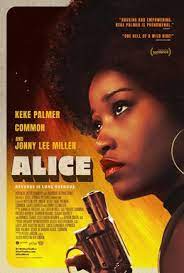
ALICE
US, 2022, 100 minutes, Colour.
Keke Palmer, Common, Jonny Lee Miller, Gaius Charles, Madelon Curtis, Kenneth Farmer, Alicia Witt.
Directed by Krystin Ver Linden.
Alice seems a straightforward title but this is not a straightforward film. It is a star vehicle for Keke Palmer. She is supported by musician-actor, Common, and Jonny Lee Miller as the villain.
The film opens in the 1860s, on a plantation, audiences very familiar with this scenario from films like 12 Years a Slave or Will Smith in Emancipation. Jonny Lee Miller is the oppressive plantation owner, cruel and arrogant, humiliating and belittling the slaves, with his wife and son, and his mother.
The film shows the details of the life of the slaves, hard work, punishment, deaths.
However, the film changes when Alice is able to escape the plantation, runs through the woods and out onto the busy highway in 1973. She has to make adjustments to the world she finds herself in – as do the audience. In fact, she seemed to adapt very quickly, accepting what she finds, being able to use it, like the telephone and the directory, reading magazines and newspapers, television, becoming very quickly informed about what had happened for African-Americans in the previous 10 years, Martin Luther King, March on Washington, his assassination…
She is picked up on the highway by a driver, Frank, Common, who befriends her, looks after her, she helping him with the confrontation with his oppressive brother. Then there is the reality of cinema, the early 1970s being the period of Blaxploitation thrillers, especially with Pam Grier and, in this film, Alice going to see Coffy and being motivated to action and revenge by Pam Grier’s performances and interviews.
Alice also meets the wife of the plantation owner and her son who are now in 1973, in a supermarket, building up to a confrontation.
Commentators urge viewers of Alice to investigate the story of Mae Louise Walls Miller and her escaping from 20th century slavery in 1963.
Ultimately, Alice makes a decision, with Frank, to drive back into the plantation, into the past, and exact revenge on the plantation owner. Which she does – with a vengeance.
- An American race issues film? The 19th century, the plantations, slavery? The 20th century, continued slavery, African-American civil rights and assertion? The reference to the real story of Mae Louise Walls Miller?
- The imagination of the film – the portrayal of life in the plantation in the 19th century, Alice and her escape, into 1973, the contemporary world, the immediate aftermath of the Civil Rights Movement, American protests and demonstrations, and the Blaxploitation films of the period, with the focus on Pam Grier and her film, Coffy?
- Audiences adjusting to the plot, the fantasy, the 19th century escape, possibilities for freedom?
- The portrait of life on the plantation, familiar, Alice, Joseph, the work, the fellow slaves and their lifestyle, the pressures, Bennett, arrogant, control, cruelty, sexual advances? His wife and son, mother, her arrogance?
- Alice, her age, character, the possibilities for escape, the deaths, into the woods, fleeing?
- Alice coming out on the highway, the vehicles, her bewilderment? The screenplay and her quick adaptation to the 1973 world, telephones and directories, newspapers, magazines, television, movies, clothes, shops…?
- The encounter with Frank, giving her a lift, his being genial, his relationship with his brother, put down by his brother, the experience with Alice, her strength, his coming out of himself, defying his brother?
- Alice, the phone calls, tracking down Rachel Bennett, the supermarket, the confrontation, the reality of the two women in the 20th century? The final confrontation, revenge?
- Frank, helping Alice, the protests, the magazines and his house, the newspapers, information about Civil Rights, and Pam Grier as a role model?
- The decision to return to the plantation, Frank and his support of others, driving into the plantation, the confrontation with Bennett, the revenge?
- An African-American response to this film? An overall American response? Beyond the United States?